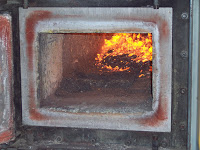by jboullion | May 13, 2011 | Uncategorized
From an article by Tom Content in the Milwaukee Journal Sentinel:
We Energies won final approval to build a $255 million biomass power plant in north-central Wisconsin Thursday.
The utility had wanted a decision this week to help it keep on target to complete construction by late 2013.
But the utility hasn’t decided whether it will proceed with the building the plant at this point. Utility spokesman Brian Manthey said We Energies and Domtar Corp., its partner in the project, are reviewing conditions that regulators attached to the deal – conditions that aim to bring down the overall cost of the project for utility customers.
The biomass plant at the Domtar paper mill in Rothschild is being proposed at a time when the utility has enough power to meet the needs of its customers but is required because of the state’s renewable portfolio standard.
That standard, adopted by the state Legislature in 2006, requires that 8.25% of We Energies’ power come from renewable sources by 2015.
If the project does not move forward, We Energies executives told investors last week they would want to have discussions with the Walker administration about alternatives, including a possible way of delaying the company’s compliance with the law.
There have been discussions of possible legislation that would help the utility delay the time frame for complying with the law, or it could take advantage of “off-ramps” built into the 2006 law that would allow it more time to comply.
by jboullion | Apr 29, 2011 | Uncategorized
From an article in the Chicago Tribune:
MADISON, Wis.— A poll of Wisconsin residents finds strong support for increasing the use of wind energy, even if doing so would raise electricity bills several dollars per month.
The Wisconsin Public Radio poll was released Friday. It shows that 77 percent of respondents want to see the state invest more in wind energy. Reasons included decreasing the nation’s reliance on foreign oil and helping the environment.
A majority, 69 percent, wouldn’t mind eight to 10 wind-energy machines being placed closed to where they live, and 79 percent favor placing the machines offshore in Lake Michigan.
Click here for poll results.
by jboullion | Apr 27, 2011 | Uncategorized
From an article in the Chicago Tribune:
MADISON, Wis.— A poll of Wisconsin residents finds strong support for increasing the use of wind energy, even if doing so would raise electricity bills several dollars per month.
The Wisconsin Public Radio poll was released Friday. It shows that 77 percent of respondents want to see the state invest more in wind energy. Reasons included decreasing the nation’s reliance on foreign oil and helping the environment.
A majority, 69 percent, wouldn’t mind eight to 10 wind-energy machines being placed closed to where they live, and 79 percent favor placing the machines offshore in Lake Michigan.
Click here for poll results.
by jboullion | Apr 27, 2011 | Uncategorized
From an article by Dan Piller in the Des Moines (Iowa) Register:
Beginning next month, motorists on Iowa highways will notice more of those huge trucks – which can be as long as 180 feet and weigh almost 400,000 pounds – hauling turbine parts as Iowa’s wind industry goes through another growth spurt.
MidAmerican Energy of Des Moines will begin construction of a 593-megawatt wind farm, which will include 193 turbines in Adair County alone.
“Wind turbine units can have up to nine loads apiece,” said Phoumine Baccum, who administers oversize truck permits for the Iowa Department of Transportation. “The blades come in three pieces, each a separate load, the towers are usually three separate loads, and there are separate loads for the hub and the nacelle and for other equipment.”
Brad Kohlwes’ family trucking company in Des Moines hauls for wind farms. “This is a real boost for the trucking industry and for Iowa’s economy,” he said. “I just wish we didn’t have to pay more than $4 for diesel like we do.”
Trucks loaded with turbine parts get about 4 miles per gallon, he said.

by jboullion | Apr 26, 2011 | Uncategorized
Frm an article by Ron Seely in the Wisconsin State Journal:
A small wood burner helps fire the boiler
to heat the Barron, Wiscosnin schools.
From smoking piles of wood chips in the countryside to dust on kitchen counters in Cassville, the difficulties posed by the conversion of the E.J. Stoneman Electrical Station in Grant County to burn wood instead of coal have challenged both village residents and plant engineers.
But the adventures and misadventures of the conversion stand as an informative and cautionary tale of what may lie ahead as Wisconsin and the rest of the country struggle to find alternative renewable fuels to help wean us from dirtier, nonrenewable combustibles such as coal.
Even so, Rich Nelson, plant manager, is more convinced than ever that the plant, one of just a few in the country that burn only wood, represents a future that will see much less dependence on nonrenewable fuels. After all, he said, it makes perfect sense to be turning demolished buildings in Milwaukee into power for more than 28,000 homes in the Cassville area.
“If we weren’t here,” Nelson said, “then all that construction material would be going into a landfill.”
The 60-year-old power plant, which rises next to the Mississippi River, was converted last year by Michigan’s DTE Energies, which has owned the plant since 2008. Its two boilers are now heated by wood rather than coal, a process known in the trade as “repowering.”
The transition has had its rough spots. Nearby residents have complained about problems such as ash on their window sills and kitchen counters, and wood chip piles stored in quarries that spontaneously combust and fill scenic valleys with blue haze.
“It’s frustrating sometimes,” Nelson said. “I think the expectation was that we’d push a button and then everybody’s feet would be up on their desks and we’d be making power.”

